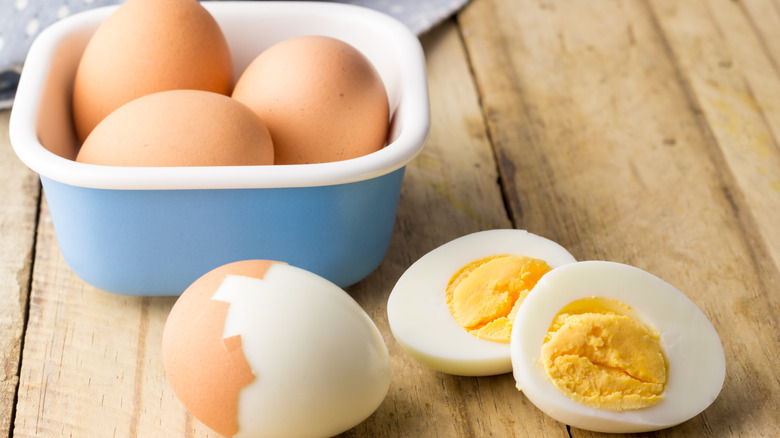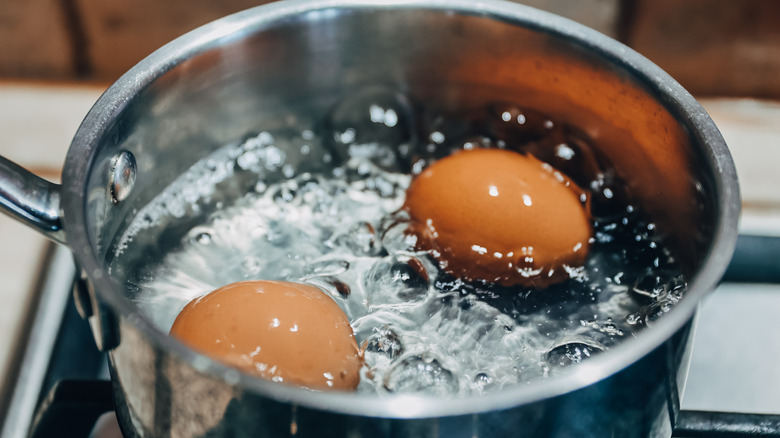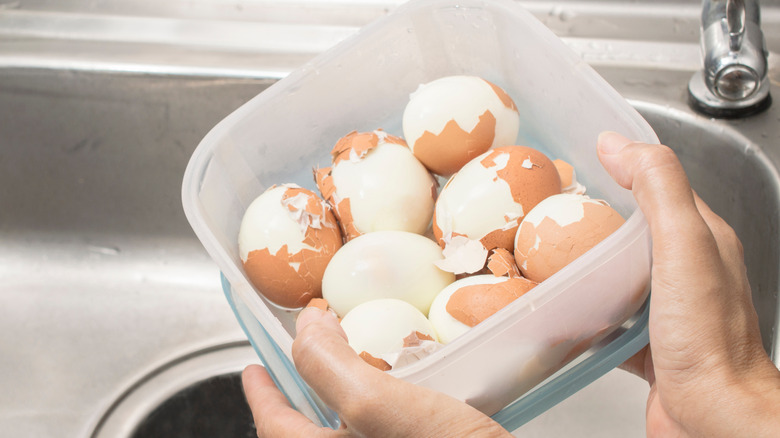Jacques Pépin's Playful Trick For Checking Egg Doneness
In order to become a bona fide culinary legend, even if it's just in your own home, you must master the basic recipes first. Hard-boiled eggs are a simple yet delicious treat perfect for breakfast, lunch, and as a snack. They are also brimming with essential nutrition. According to WebMD, eggs are an excellent source of protein, iron, and choline, which is essential for healthy cognitive development.
While hard-boiling eggs seems relatively straightforward, there is plenty of room for error if you're not careful. That's why world-famous chef Jacques Pépin uses his extensive skill and experience to help everyday cooks hone their culinary talents. Pépin started his professional career in the mid-1950s in France and soon after moved to America where his impressive abilities won him numerous jobs in prestigious restaurants. The chef also penned multiple cookbooks and hosted a variety of cooking shows, which introduced his iconic techniques to a wider audience. His hard-boiled egg trick is particularly notable for its simplicity and effectiveness.
Why playing with your food is actually a good thing
Even the most seasoned chefs can have difficulty determining whether a hard-boiled egg is fully cooked. That's why Pepin employs a helpful maneuver to gauge the doneness of his eggs. As described by Food & Wine, the master chef takes the egg and spins it on the counter after cooking. When the hard-boiled egg is fully cooked to Pépin's liking, it will rise up on its end as it spins, just like a toy top. If the egg is underdone, it will merely wobble on the counter. And if it's not cooked at all, it won't fully spin.
Like most strange occurrences, science has the answer as to why a cooked egg spins like a top. Science Alert explains that hard-boiled eggs rise as they spin because there is a difference between the egg's center of mass and the point that it connects with the table. This differential creates a wobbling motion as the egg spins, which then pushes the egg onto its end and changes its angle. The same trick does not work with an uncooked egg, as the liquid center is constantly moving around inside.
Other helpful tips when cooking hard-boiled eggs
While Pepin's trick is indispensable for ensuring your hard-boiled egg is completely cooked, there are other smart tips to keep in mind. Get Cracking recommends pouring cold water over the eggs as soon as the pot has been drained after boiling. Bringing down the temperature at a rapid pace will help you avoid that unpalatable green color that can form around the yolk. According to the University of Nebraska-Lincoln, this happens when eggs are cooked for too long, which causes a reaction between the chemicals in the yolk and egg white.
While not necessarily a cooking tip, Today offers some advice on how to peel eggs efficiently after cooking. If you're only peeling an egg or two for yourself, you can use a spoon to get an even peel with very little mess. In this case, create an opening in the shell at the wide end of the egg. Next, take a spoon and gently slide it under the shell so the concave side is cupping the egg. Now, turn the egg in a circle to remove the shell. If you're cooking a lot of eggs for a big gathering, take a container with a lid and place several eggs inside, making sure to leave a little room for them to move around. Add a bit of cold water, replace the lid, and lightly shake the container back and forth. The rocking motion should help the peels come off the eggs naturally.


